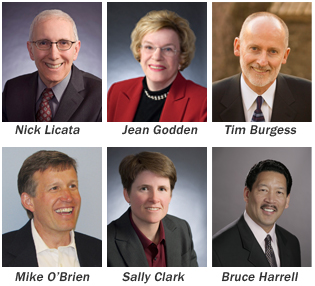From the Seattle Times:
 Seattle appears poised to become the third city in the country to require businesses to provide paid sick leave to their workers.
Seattle appears poised to become the third city in the country to require businesses to provide paid sick leave to their workers.
Six of the City Council’s nine members signed onto a plan Thursday that mandates businesses with at least five employees to provide at least five paid sick days, and that, based on a sliding scale, larger businesses provide more time off — up to nine days per year.
Advocates say the law will enhance public health by allowing workers to stay home when they or their children are sick. The city estimates that as many as 190,000 workers in Seattle, many in professions such as food service with regular contact with the public, receive no paid sick leave.
“This is so significant for people who work in Seattle and for their families,” said Marilyn Watkins of the Seattle Healthy Workforce Coalition, her voice breaking with emotion. “This is huge.”
The coalition has been a major supporter of the bill.
While noting that the legislation is still subject to approval by the full council Monday, Watkins said, “This will provide practical assistance to so many people. You really shouldn’t have to go to work sick.”
The coalition was joined by many labor organizations, civil-rights groups and an increasing number of small-business owners who said the costs weren’t as great as they’d initially feared.
But others in the business community, notably the Greater Seattle Chamber of Commerce, still object to provisions of the bill.
“While there have been changes which make it less onerous, we still have concerns,” said George Allen, senior vice president for government relations with the chamber.
He said one provision allows the sick-leave requirement to be waived as part of collective bargaining, undermining the law’s public-health goal. While that would seem to be more of a union concern, Allen said, unions could use sick leave as a bargaining chip.
And he said workers would likely lose other benefits, such as pay raises, health insurance or vacation days, as employers shift costs to pay for the mandated sick days.
The chamber suggested that paid sick leave was a state issue and needed further study.
San Francisco voters in 2006 approved mandatory paid sick days for all employers. Since then, Milwaukee and Washington, D.C., have enacted similar provisions, although Wisconsin subsequently pre-empted cities’ right to adopt a sick-leave ordinance.
The Healthy Workforce Coalition modeled the Seattle ordinance on the San Francisco bill, Watkins said. But she said that at the urging of City Council members, her group sat down with small businesses and talked about how the legislation would affect them.
Councilmember Nick Licata, who introduced the legislation, said the amended bill addresses the majority of business concerns.
It eliminated any requirement for businesses with fewer than five full-time employees. It eliminated a separate category for employers with more than 1,000 employees, and it streamlined the rate at which workers accrue sick days, he said.
Licata said, “Seattle will stand out as a city that supports good working conditions for employees.”
Employees have to work six months before being eligible for paid time off. Students in work-study jobs or summer internships with nonprofits would not be eligible.
Licata’s original proposal called for a phased-in approach to the bill, with larger businesses being required to start providing paid time off six months after the bill was adopted.
The amended version delays implementation a year to allow businesses more time to prepare.
“There was concern that implementing this now, when we’re not out of the economic slump, would be unwise,” said Councilmember Tim Burgess.
The measure also now requires the city auditor to evaluate its effect on business after it has been in place for one year. Councilmember Sally Clark said that provision addresses another issue raised by business.
“For a lot of cities, this is new territory. The evaluation component is important because there’s a lot of conjecture on both sides about what this will mean,” Clark said.
Advocates also say that lack of sick leave disproportionately affects low-income families.
Makini Howell, owner of Plum Bistro on Capitol Hill and two other Seattle restaurants, said the paid sick-leave ordinance reflects the values of many Seattleites.
“A lot of progressive business owners were completely on board once they got more details,” Howell said. “We’ve all had jobs. This is how we’d like to be treated.”
Signing on to the plan Thursday were Councilmembers Burgess, Clark, Licata, Jean Godden, Bruce Harrell and Mike O’Brien.
More To Read
March 24, 2025
Remembering former Washington State House Speaker Frank Chopp
Rep. Chopp was Washington state’s longest-serving Speaker of the House
February 11, 2025
The rising cost of health care is unsustainable and out of control
We have solutions that put people over profits
January 29, 2025
Who is left out of the Paid Family and Medical Leave Act?
Strengthening job protections gives all workers time they need to care for themselves and their families
